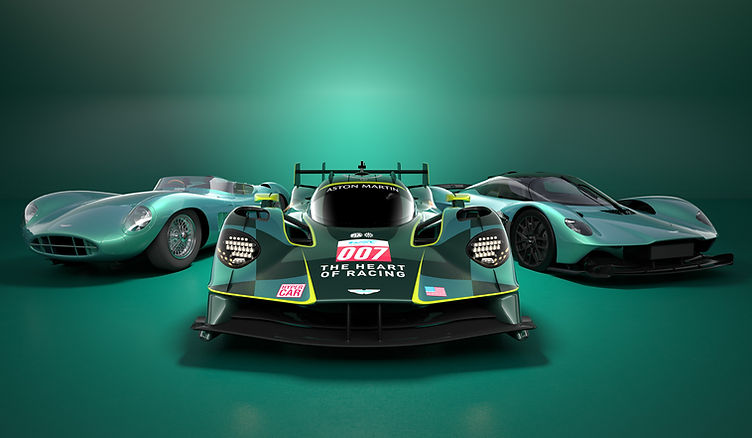Planning to debut their new Valkyrie racer into the class that would accept road car-based entries to compete for overall wins for the first time since the late 1990s, it looked set to be an emphatic return for the much loved brand to the top flight of endurance competition. The cars were due to enter in the 2020/2021 winter-summer WEC season, and Aston Martin would have a chance of competing for overall wins for the first time since 2011. The car that looked like it was born to go to Le Mans would make it there. It was going to be perfect, but then 2020 happened.
Having fallen into financial difficulties, Aston Martin received significant investment from a consortium led by Canadian billionaire Lawrence Stroll, who had saved the Force India F1 team from dissolution the year prior. People on the outside put two and two together, and the Racing Point F1 team would be rebranded to Aston Martin for 2021. It was clear where the focus would be for the company’s racing ambitions, and as such the Valkyrie LMH project was placed on an indefinite hiatus in February 2020, with the world grinding to a halt just a few weeks later in the wake of the announcement.

However, in the second half of 2023, interesting reports started appearing in podcasts and on the Dailysportscar website; the Valkyrie racer was not dead, and work was underway to get the car to race competitively at long last. All they needed to do was make it official. So why the change of heart?
To cut a long story very short, the two championships where top-level endurance prototypes ply their trades are the FIA WEC - which has the 24 Hours of Le Mans as its starring event - and the IMSA WeatherTech Sportscar Championship in the United States of America. The European and American-based championships used to share technical rulesets and it was common for top-category cars in one championship to race in the other; Peugeot preferred the Le Mans Series, while Audi opted for the American Le Mans Series for the most part.
Eventually, IMSA and the WEC diverged for their top class formulae, with IMSA favouring privateer-friendly cost-capped cars known as DPi, as the ACO opted for the fabulously fast, powerful, aero-dependent, and incredibly expensive LMP1 hybrids.

The manufacturers and the teams filled the DPi ranks in no time, while post-2013 LMP1 peaked at four factory teams, with valiant privateer efforts from BR Engineering and Rebellion Racing. One category collapsed, the other garnered more interest. When it became time for the rulesets to be rewritten, there was one word on everyone’s lips: convergence.
Could rules to allow brands to build their own cars from scratch, or modify an existing car be balanced together to allow two routes into the biggest endurance races in the world? Thankfully, yes. And this is where we begin to get back on track.
The Automobile Club de l’Ouest (ACO) created the Le Mans Hypercar (LMH) ruleset while IMSA evolved the DPi formula to create Le Mans Daytona h (LMDh - nobody knows what the “h” stands for) formula. IMSA’s regulations see cars being built around one of four specified chassis, a spec hybrid system being attached to an OEM engine, and a prototype racer being restyled with manufacturer-specific cues, like the Porsche 963. LMH sees the brand making the entire car from scratch, like Ferrari have for their 499P.


Top: Ferrari 499P LMH. Bottom: Porsche 963 LMDh
Aston Martin watched from afar as a new golden age in sportscar racing began without them, but with the company returning to profitability and an interested party willing to work with them to take the Valkyrie to competitive racing, the stars finally re-aligned for the project. In 2024, Aston Martin officially announced the Valkyrie AMR-LMH programme in conjunction with US-based team The Heart of Racing. Following testing with a modified AMR Pro mule, the first laps were turned by a purpose-built Valkyrie AMR-LMH at Donnington Park and Silverstone.
So with the history out of the way, it’s time to focus on the present and the future. While it’s evolved from the AMR Pro model, the AMR-LMH is not just a track-only hypercar with a number panel on the sides. It's powered by the same 6.5-litre naturally aspirated V12 engine, but it won’t be making the 1,000bhp or hitting the 11,000rpm rev limiter of the production model.
Instead, Aston Martin say that the revised, “lean burning” Cosworth engine has been tweaked to withstand the long flat-out runs that modern endurance racing sees. LMH and LMDh cars are capped at 671 bhp before the Balance of Performance (BoP) adjustments give and take power and weight to ensure that cars of different shapes, sizes and powertrains can compete in the same ballpark. The racing Valkyrie differs further from the AMR Pro by dispensing with the hybrid system and adopting a different aerodynamic concept to the road and track cars.


The car looks gorgeous, and has a longer, lower nose with a redesigned front splitter and an enlarged rear wing. While we are yet to see underneath the racer, the car retains the large rear diffuser of the road car, presumably with a modified floor in order to comply with the drag-to-downforce requirements of the LMH ruleset.
The Heart of Racing will have operational support from Multimatic, and will enter the green #007 and #009 cars in the FIA WEC from the first round in Qatar. A single blue-liveried Valkyrie will join the IMSA WeatherTech Sportscar Championship from the second round of the season. The cars will be driven by Harry Tincknell, Tom Gamble, Marco Sorensen, and Alex Riberas in the WEC, while Ross Gunn, and Roman De Angelis will share driving duties in IMSA. All six drivers will join forces for the longest races on the WEC calendar.
The V12-powered prototype will be taking on the most prestigious endurance races in the world including the 12 Hours of Sebring, and 24 Hours of Daytona, but Aston Martin has made it clear that the aim is to take overall honours at the 24 Hours of Le Mans. The brand has multiple GT-category wins at the Circuit de La Sarthe, but its sole overall win came in 1959, when Carrol Shelby and Roy Salvadori led a 1-2 finish in the open-top DBR1.


The question is, can they do it? Every racing fan hopes so, but hybrid prototypes have been victorious at Le Mans since 2012, and there has always been a difference in single-lap and stint-length pace between hybrid and non-hybrid runners at Le Mans; even when non-hybrid cars like the Glickenhaus SCG007 and Alpine A480 were given extra engine power and fuel usage allowances, they were no match for the pace of the Toyota GR010 Hybrid.
Being the only manufacturer not to run a hybrid system in the WEC Hypercar and IMSA GTP classes is a bold move, and one that surely is seen as a risk worth taking by the brains behind the effort, or else the Valkyrie would be running with electrical assistance along with its sonorous V12. It's certain to become a fan favourite for its looks and soundtrack alone, but its fuel consumption and stint pace remain to be seen. Regardless, the Valkyrie project has finally come full circle, and this year it will finally begin competing against the cars it should've been battling for the last three years.

-01.svg)








.svg)

